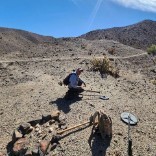Report On Noisy, Salty Northern Nevada Ground, The GPZ And The SDC
-
Similar Content
-
- 23 replies
- 1,416 views
-
Rye Patch Nevada Rare Specimen Gold, Crystals, Field Training & Photos 1 2
By Gerry in Idaho,
- gold found
- nevada
- (and 1 more)
- 17 replies
- 1,483 views
-
- 8 replies
- 675 views
-
- 21 replies
- 1,939 views
-
- 4 replies
- 4,319 views
-
- 44 replies
- 4,519 views
-
-









Recommended Posts
Create an account or sign in to comment
You need to be a member in order to leave a comment
Create an account
Sign up for a new account in our community. It's easy!
Register a new accountSign in
Already have an account? Sign in here.
Sign In Now